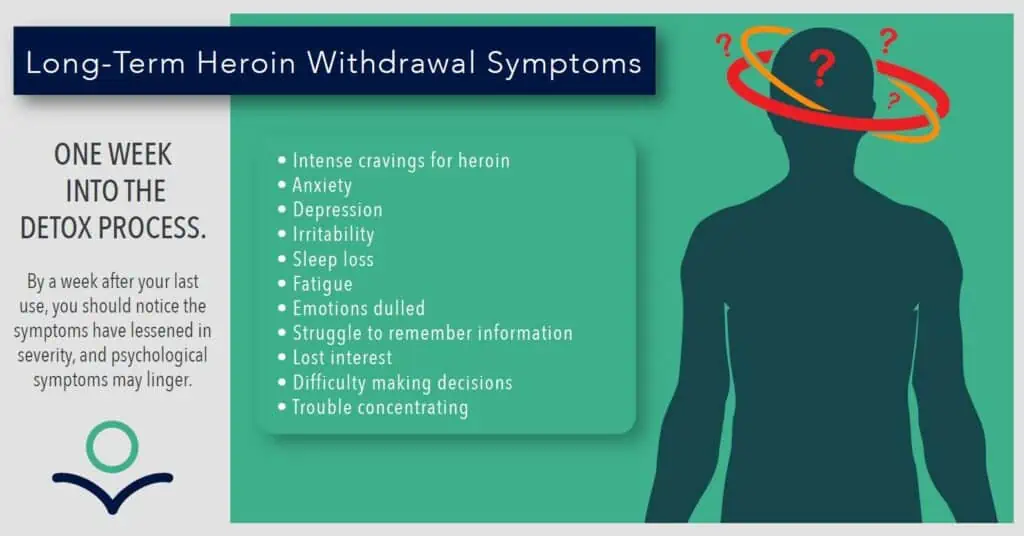If you’ve ever tried quitting opioids or heroin unsuccessfully, you know the challenge of overcoming the withdrawal symptoms. These symptoms can be intense, no doubt. While there is no way to avoid all symptoms, understanding when they appear and how long they last can be helpful. It’s also important to recognize the value of receiving help in managing these symptoms through medically-supervised detoxification.
Withdrawal symptoms from stopping heroin use can be short-term, appearing and lasting from a few days up to a week or so. These symptoms may include sweating, dilated pupils, and muscle spasms. Symptoms, such as cravings or obsessions to use or depression, can linger long after the short-term effects end. Detoxing at home can lead to a return to heroin use as short-term symptoms overwhelm you. Medically-supervised detox allows you to safely move through withdrawal in an environment with supervision by doctors who can also address other conditions, such as high blood pressure, malnutrition, and cardiovascular problems.
If you or a loved one need help, call our admissions team today at 561-270-1753.Heroin Withdrawal
After months (or more) of regular heroin use, quitting the drug can lead to the onset of numerous symptoms. Some may be minor, while others appear more distressing. Your body has built up a tolerance to the drug to the point that even using less can produce some form of withdrawal. Withdrawal also can be affected by other factors, such as how much heroin you use, how long you have used it, what additional substances you misuse, and how much time you have between doses.
Symptoms of Heroin Withdrawal
There are two types of symptoms that come from heroin withdrawal. The first appears right away and lasts a short period of time. The second type appears later and can linger for a much longer time.

Short-Term Heroin Withdrawal Symptoms
● Your pulse quickens.
● Your breathing rate increases.
● Your blood pressure increases.
● Your body temperature rises.
● You experience insomnia or another sleep disruption.
● Your pupils dilate.
● Your reflexes become heightened.
● You sweat.
● Goosebumps appear on your skin.
● A watery discharge comes from your eyes and nose.
● You feel cramps, muscle spasms, and pain.
● You feel nausea and may vomit.
● You have diarrhea.
● You have cravings for heroin.

Long-Term Heroin Withdrawal Symptoms
● You have cravings for heroin.
● You experience anxiety and or depression.
● You lose sleep.
● You feel fatigued.
● Your emotions feel dulled.
● You lose interest in activities you used to enjoy.
● You often feel irritable.
● You struggle to remember information.
● You have trouble concentrating at work, and making decisions seems difficult.
Timeline of Heroin Withdrawal
6 to 12 Hours
If you stop using heroin in the evening, withdrawal symptoms may begin to appear overnight or by the following day. However, you may think these symptoms are connected to getting a cold or the flu, and you’ll feel other effects in your body.
One to Three Days
If your last time using heroin was on a Friday night after work, you’ll notice symptoms intensifying over the weekend and into the following week. Your craving for the drug may compel you to use it again before returning to work on Monday. The first few days of the withdrawal are the peak time and often what contributes to people like you using again.
One Week
By a week after your last use, you should notice the symptoms have lessened in severity. Some specific physical symptoms may have stopped altogether. On the flip side, the psychological symptoms may still linger. Intense cravings for the drug may be among them.
Two Weeks and Beyond
At this point, your body has naturally removed the heroin from your system. However, you may still feel cravings. You may also notice symptoms of depression or anxiety appear and last for weeks or even months.
Benefits of Medically-Supervised Detox
Heroin withdrawal itself doesn’t tend to be life-threatening when done alone, but it can lead to more severe complications. These complications can come from untreated symptoms of diarrhea or vomiting which lead to dehydration. If you’re exercising while dehydrated and experiencing heroin withdrawal, heatstroke may be an outcome. Urinary tract infections and kidney failure can result from untreated dehydration during withdrawal. With your body’s electrolytes out of balance, you may experience a loss of consciousness or seizures.
A medically-supervised detox experience helps you safely experience withdrawal while under the care of doctors 24/7. These medical professionals can administer medication to treat symptoms of heroin withdrawal as well as address existing medical conditions. If you’ve already been diagnosed with high blood pressure, heart issues, malnutrition, liver disease, or some other chronic condition, starting your long-term recovery work at a medically-supervised detox facility is a sensible choice.
Tour Headwaters
 Hanley Foundation’s Headwaters is a non-profit addiction treatment program for executives, public figures, other affluent individuals, and their loved ones. Headwaters offers leading-edge, personalized clinical care for mental health and substance use disorders, and our professional and compassionate staff can help you achieve holistic wellness. To start your healing journey, call 561-270-1753 today.
Hanley Foundation’s Headwaters is a non-profit addiction treatment program for executives, public figures, other affluent individuals, and their loved ones. Headwaters offers leading-edge, personalized clinical care for mental health and substance use disorders, and our professional and compassionate staff can help you achieve holistic wellness. To start your healing journey, call 561-270-1753 today.




